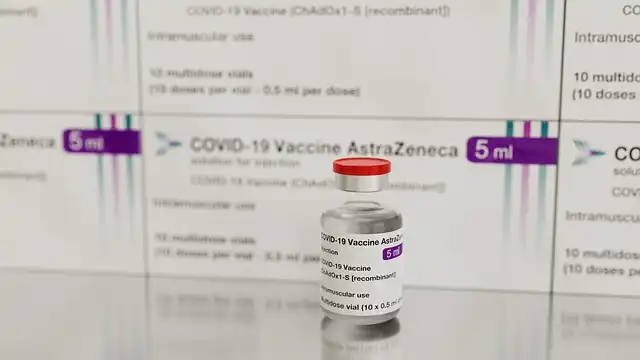AstraZeneca Admits for the First Time that its COVID Vaccine Has Blood Clot Side Effects
- “Miracle Weight-Loss Drug” Sweeps Across America
- The United States Avian Influenza Outbreak Worse Than Expected?
- Global First: Bovine Avian Influenza Transmission to Humans Detected
- Potassium-Enriched Salt Substitutes: Reducing Blood Pressure Risk?
- Tritium Detection in Fukushima’s Seawater: Below Safety Standards
- What Reason Let AstraZeneca Withdraws COVID Vaccine From The Market?
AstraZeneca Admits for the First Time that its COVID Vaccine Has Blood Clot Side Effects
- AstraZeneca Admits for the First Time that its COVID Vaccine Has Blood Clot Side Effects
- Was COVID virus leaked from the Chinese WIV lab?
- HIV Cure Research: New Study Links Viral DNA Levels to Spontaneous Control
- FDA has mandated a top-level black box warning for all marketed CAR-T therapies
- Can people with high blood pressure eat peanuts?
- What is the difference between dopamine and dobutamine?
- How long can the patient live after heart stent surgery?
AstraZeneca Admits for the First Time that its COVID Vaccine Has Blood Clot Side Effects
UK pharmaceutical company AstraZeneca has admitted in court for the first time that its COVID vaccine can cause deadly blood clot side effects. Dozens of families claim they or their loved ones have been disabled or killed by this pharmaceutical giant’s “defective” vaccine, with this extremely rare side effect forming the core of their multimillion-pound collective lawsuit.
Lawyers representing the claimants believe that some of these cases could result in compensation amounts as high as £20 million.

AstraZeneca, based in Cambridge, acknowledged in a legal document submitted to the High Court in February that its vaccine “can, in very rare cases, lead to TTS.”
TTS stands for thrombosis with thrombocytopenia syndrome, a condition characterized by low platelet counts and blood clots. Platelets usually help with blood clotting.
This complication is listed as a potential side effect of vaccination, previously referred to as vaccine-induced immune thrombotic thrombocytopenia (VITT).
AstraZeneca’s admission could lead to compensation on a case-by-case basis.
According to the UK’s Telegraph, while AstraZeneca acknowledged the potential side effects of its vaccine two years ago, this is the first time the company has admitted in court that its vaccine can lead to this condition.
Since AstraZeneca struck a compensation deal with the government during the Covid crisis to expedite vaccine production when the nation was paralyzed by lockdowns, taxpayers could foot the bill for any potential settlements.
Just days ago, the company reported revenue exceeding £10 billion for the first quarter of 2024, a 19% increase. Company officials said they had a “very strong start” to the year.
Jamie Scott, a father of two and an IT engineer, is one of those seeking compensation for injuries related to the AstraZeneca vaccine.
After receiving the vaccine in April 2021, he developed blood clots and bleeding in his brain, leading to permanent brain damage. Since then, he has been unable to work.
His case is one of 51 currently before the High Court in the UK, with the total value of claims estimated at around £100 million.
Upon hearing the news, Mr. Scott’s wife, Kate Scott, said, “I hope their admission means we can resolve this issue as soon as possible. We need an apology and fair compensation for our family and others affected. The truth is on our side, and we won’t give up.”
Lawyers representing the claimants suing AstraZeneca, Leigh Day, accused the company of employing delay tactics against the victims.
Sarah Moore, a partner at Leigh Day, said, “Sadly, AstraZeneca, the government, and their lawyers seem more interested in playing tactical games and increasing litigation costs than in taking seriously the devastating impact their AstraZeneca vaccine has had on our clients’ lives.”
AstraZeneca said in a statement, “We sympathize with those who have lost loved ones or reported health issues. Patient safety is paramount for us, and regulatory agencies have clear and stringent standards to ensure the safe use of all medicines, including vaccines. Based on a wealth of clinical trial evidence and real-world data, the AstraZeneca-Oxford vaccine has consistently demonstrated acceptable safety, with regulatory agencies worldwide agreeing that the benefits of vaccination outweigh the extremely rare risks of potential side effects.”
AstraZeneca had previously claimed in documents submitted to the court last year that, “on a general level,” TSS could not be caused by its vaccine, a claim that has now been altered in the new filings submitted to the court.
In its new submission, AstraZeneca also added that the cause of TSS in some people who received the AstraZeneca vaccine is unclear and may also occur in individuals unrelated to any vaccine.
The company claims that the causality of any individual case will be demonstrated by experts.
AstraZeneca denies that its newly submitted documents represent a reversal of its admission in court documents that its vaccine can lead to TTS.
Lawyers representing victims and families sued AstraZeneca under the Consumer Protection Act 1987. They believe the vaccine is a “defective product” that “fails to meet consumers’ reasonable expectations of safety.” AstraZeneca strongly denies these claims.
Rewind to the past…
Health officials first detected cases of VITT associated with the AstraZeneca vaccine in Europe as early as March 2021, just over two months after the vaccine was first used in the UK.
However, it wasn’t until April of that year that the evidence became clear enough to start restricting the use of the vaccine.
Local officials initially limited its use to those over 30. By May 2021, they had expanded the age range to include those over 40.
The AstraZeneca vaccine was still deemed worthwhile for older people in the UK, as they faced a greater risk of death or injury from contracting the virus.
A total of around 50 million doses of the AstraZeneca vaccine were administered in the UK.
Official figures show that at least 81 people in the UK have died from blood clot complications clearly linked to the AstraZeneca vaccine, with an additional number of unconfirmed injuries and/or disabilities.
As the rollout of COVID vaccines progressed, AstraZeneca’s vaccine was phased out in the UK in favor of mRNA alternatives produced by competitors like Pfizer and Moderna.
Based on current data, the risk of developing TTS after receiving the AstraZeneca COVID vaccine is estimated to be around one in fifty thousand. However, AstraZeneca emphasizes that its vaccine has saved the lives of approximately 6 million people worldwide during the COVID pandemic.
Many claimants also acknowledge this and say they believe in the public benefit of vaccination, and they are not anti-vaccine. The reasons for legal action are complex.
Some severely disabled individuals face enormous ongoing medical expenses and unemployment. In some cases, their families have had to give up work to provide round-the-clock care.
Others, at least to some extent, seek justice for their lost loved ones or the lives that have been permanently altered due to injury.
Some are suing because they believe the government’s vaccine damage compensation scheme is inadequate or too arbitrary. Under UK law, families of those who die or are “seriously disabled” as a result of a vaccine are entitled to a tax-free sum of £120,000, but there are also some restrictions. (The compensation scheme has been in place since 1979.)
As the injuries caused by the vaccine affect a very small number of people, experts are concerned that this will make the general population hesitant about vaccines in the future, endangering the public health threat posed by various preventable diseases.
AstraZeneca Admits for the First Time that its COVID Vaccine Has Blood Clot Side Effects
(source:internet, reference only)
Disclaimer of medicaltrend.org
Important Note: The information provided is for informational purposes only and should not be considered as medical advice.



